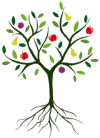Ribston Pippin
A particuarly handsome apple, thought to be one of the parents of Cox's Orange Pippin. It has some of the aromatic qualities of that variety when eaten fresh, but is noticeably sharper in flavour - and for this reason is often used in the kitchen as well.
By Victorian times Ribston Pippin was very popular as a late autumn apple, and the Victorian fruit enthusiast Robert Hogg reported that it was in "greatest perfection during November and December".
Ribston Pippin apple trees for sale
RF11-year bare-root
tree
on MM106 rootstock£34.95
Mature height: 3m-5m after 10 years
Can be trained on as a large free-standing apple tree, a half-standard apple tree, a large apple fan or espalier, or a pleached apple tree. Available next season
RF22-year bare-root
tree
on MM106 rootstock£43.00
Mature height: 3m-5m after 10 years
Suitable for a large bush-trained free-standing apple tree. Available next season
RF32-year half-standard bare-root
tree
on MM106 rootstock£46.50
Mature height: 3m-5m after 10 years
Suitable for a free-standing half-standard apple tree. Available next season
RF41-year bare-root
tree
on M25 rootstock£35.75
Mature height: 5m-7m after 10 years
Can be trained on to produce a big 'standard' free-standing apple tree in a traditional apple orchard. Available next season
Growing and Training
Ribston Pippin is a tough tree, suitable for growing throughout England and much of Scotland - but it needs a sheltered situation in more northerly gardens and it prefers a drier climate than a wet one if possible.
Recommended pollinators for Ribston Pippin apple trees
Ribston Pippin is not self-fertile and is also a poor pollinator of other varieties. Ideally you need two other different but compatible varieties planted nearby in order to produce fruit, or one compatible self-fertile variety.
The following varieties are good pollinators for Ribston Pippin.
If you are not sure about pollination requirements don't hesitate to ask us.
ScrumptiousScrumptious is a modern award-winning early-season English dessert apple.
SpartanSpartan produces lots of crimson maroon apples, crunchy, sweet, easy to grow, delicate "vinous" flavour.
Red FalstaffRed Falstaff is one of the best garden apple trees, heavy crops, easy to grow, and very juicy.
SunsetSunset is a popular garden alternative to Cox, easier to grow, with a sweet aromatic flavour.
FiestaFiesta (or Red Pippin) is one of the best Cox-style apples, easy to grow, with a good aromatic flavour.
Red DevilRed Devil is a good apple variety for the UK garden, and produces a sweet red-tinted juice.
GreensleevesGreensleeves is a reliable and popular mid-season green/yellow apple, easy to grow and productive.
Worcester PearmainWorcester Pearmain is a well-known early-season English apple, noted for its strawberry-like flavours.
History
Named after Ribston Hall in North Yorkshire, England, where this variety was first planted in the 18th century. Having been grown in Yorkshire for more than 200 years Ribston Pippin is rightly regarded as a traditional Yorkshire variety, however it was almost certainly brought to Ribston Hall from France.
Ribston Pippin characteristics
- Gardening skillAverage
- Fruit persistenceNormal ripening
- Self-fertile?Not self-fertile
- Pollinating othersPoor
- Pick seasonLate
- Picking periodmid-September
- Keeping1-2 months
- Food usesEating freshCulinary
- Country of originUnited Kingdom
- Period of origin1700 - 1749
- Fruit colourOrange flush
You might also like these varieties
Charles RossCharles Ross is a very attractive classic English dual-purpose apple.
Kidd's Orange RedKidd's Orange Red is one of the best Cox-style apples, aromatic, sweet, and easy to grow.
SunsetSunset is a popular garden alternative to Cox, easier to grow, with a sweet aromatic flavour.
More about apple trees
Apples are very versatile, and all varieties can be eaten or used in the kitchen. However varieties specifically grown as eating apples tend to have the best flavours for eating raw.
The main thing to decide when choosing an eating apple is when you intend to eat the apples. Early season apples are typically ready in August, and generally don't keep very long. Mid-season apples are ripe in early September, while late-season apples start to become ripe in late September and October. Many of the late-season varieties can also be stored in a fridge or cold shed for several months into the winter.
Some apple varieties are self-fertile, but most are not. However in most areas of the UK you do not need to worry whether your apple trees are self-fertile or not, as there will be other apple trees in nearby gardens to help with pollination.
